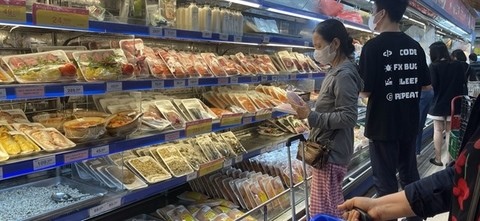HCM City producers, distributors increase supply to disaster-hit north
HCM City producers, distributors increase supply to disaster-hit north
Essential goods producers and distributors in HCM City are ramping up their efforts to increase stocks and swiftly transport them to the north, which has been severely affected by the disasters caused by typhoon Yagi.

Co.opmart supermarkets in the north ensures a sufficient supply of goods at assured quality and steady prices. — Photo courtesy of Saigon Co.op |
Lý Kim Chi, chairwoman of the HCM City Food and Foodstuff Association, said after receiving information about the devastation, her association immediately worked with key producers to increase output to ensure the north gets adequate supply of goods.
"We will ensure adequate supply of dried and processed foods.
“Our member businesses are committed to maintaining steady prices."
Food and foodstuff businesses in the city are coordinating with retailers and transporters to expedite shipment to the north, she said.
The association is working with its members, particularly those with facilities and warehouses close to typhoon-hit areas, to ensure quick supply, she said.
It has launched a campaign to collect donations to aid people affected by the storm and its aftermath, and received a lot of contributions, she added.
Major retailers such as Saigon Co.op, MM Mega Market and Central Retail have also announced an increase in shipments to the north.
Saigon Co.op, which has 11 Co.opmart supermarkets and 28 Co.op Food stores in Hà Nội, Hải Phòng, Vĩnh Phúc, Bắc Giang, and Phú Thọ, has quickly tripled its normal supply to them.

Saigon Co.op’s northern distribution centre operates 24/7 to coordinate the transport of goods to its stores in the typhoon-hit north. — Photo courtesy of Saigon Co.op |
Its northern distribution centre in Bắc Ninh Province is operating on an emergency basis, with all staff working in shifts and overtime to keep the centre running 24/7 to coordinate the transport of goods.
It has mobilised trucks from its other distribution centres and used smaller trucks to serve the northern market.
To make up for the vegetable shortages caused by the damage to farms in the north, the retailer has increased its purchase from Đồng Nai, Lâm Đồng and some Mekong Delta provinces to ship to the north.
In addition to ensuring stocks, hygiene and safety and steady prices, Co.opmart in collaborated with suppliers is also offering discounts dedicated to the northern market.
It reported that footfall and sales at its northern outlets have increased by 50 per cent from normal days, and online orders have doubled or tripled, especially for foods such as instant noodles, rice noodles, dry vermicelli, biscuits, and milk.
Vũ Anh Khoa, Saigon Co.op’s chairman, said the retailer is focusing its resources on sharing and supporting typhoon and flood-hit provinces in the north.
He asked its northern distribution centre to proactively participate with localities and organisations to ensure timely supply of goods to customers and people in need, and is ready to transport goods to mountainous and remote areas when needed.
MM Mega Market Vietnam has increased the staff size at northern warehouses to ensure prompt supply and transport of goods to its stores and customers.

Abundant vegetables and fruits on sale at MM Hồng Bàng in Hải Phòng Province. — Photo courtesy of MM Mega Market |
Trần Kim Nga, its external affairs director, said MM has for long focused on building a closed supply chain, and has five sourcing stations, two large storage warehouses in Bình Dương, and six B2B delivery depots, and so its stocks are is capable of meeting demand in the north for a full month.
It has tripled the supply of goods from the south to the north and from northern warehouses to its customers, and MM is ready to collaborate with rescue and relief workers and charities who need large quantities of relief supplies, she said.
Central Retail Vietnam, owner of GO! and Big C supermarket chains, has doubled its normal supply of vegetables.
Businesses in the south are closely coordinating with distribution and retail systems that have networks in the north to promptly supply essential goods.
Businesses and retailers are also working with State agencies and local authorities to provide relief to affected people.






















